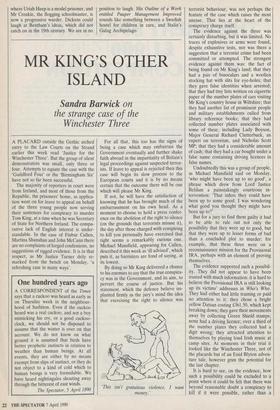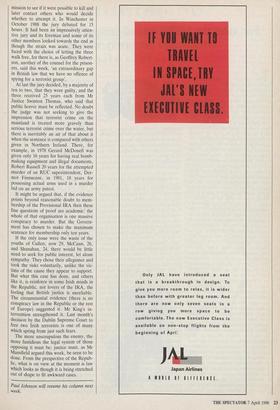MR KING'S OTHER ISLAND
Sandra Barwick on
the strange case of the Winchester Three
A PLACARD outside the Gothic arched entry to the Law Courts on the Strand earlier this week read 'Justice for the Winchester Three'. But the group of silent demonstrators was small, only three or four. Attempts to equate the case with the 'Guildford Four' or the 'Birmingham Six' have not so far been successful.
The majority of reporters in court were from Ireland, and most of those from the Republic, the prisoners' home, as applica- tion went on for leave to appeal on behalf of the three young people now serving their sentences for conspiracy to murder Tom King, at a time when he was Secretary of State for Northern Ireland. The compa- rative lack of English interest is under- standable. In the case of Finbar Cullen, Martina Shanahan and John McCann there are no complaints of forged confessions, no suggestions of rigged evidence. It is in that respect, as Mr Justice Turner drily re- marked from the bench on Monday, 'a refreshing case in many ways'. For all that, this too has the signs of being a case which may embarrass the Government eventually and further shake faith abroad in the impartiality of Britain's legal proceedings against suspected terror- ists. If leave to appeal is rejected then this case will begin its slow process to the European courts and it is by no means certain that the outcome there will be one which will please Mr King. If not, he will have the satisfaction of knowing that he has brought much of the embarrassment on his own head. As a moment to choose to hold a press confer- ence on the abolition of the right to silence (on the grounds that terrorists misuse it), the day after those charged with conspiring to kill you personally have exercised that right seems a remarkably curious one. Michael Mansfield, appearing for Cullen, described it this week as 'ill advised', which puts it, as barristers are fond of saying, at its lowest.
By doing so Mr King delivered a chance to his enemies to say that the true conspira- cy was in the Government, and its aim, to pervert the course of justice. But his statement, which the defence believe im- planted firmly in the jury's mind the idea that exercising the right to silence was 'This isn't gratuitous violence, I want money.' terrorist behaviour, was not perhaps the feature of the case which raises the most unease. That lies at the heart of the conspiracy charge itself.
The evidence against the three was certainly disturbing, but it was limited. No traces of explosives or arms were found, despite exhaustive tests, nor was there a suggestion that a terrorist crime had been committed or attempted. The strongest evidence against them was: the fact of being found on Mr King's land; that they had a pair of binoculars and a woollen stocking hat with slits for eye-holes; that they gave false identities when arrested; that they had tiny lists written on cigarette paper of the number plates of cars visiting Mr King's country house in Wiltshire; that they had another list of prominent people and military establishments culled from library reference books; that they had collected number plates associated with some of these, including Lady Boyson, Major General Richard Clutterbuck, an expert on terrorism, and Nicholas Scott MP; that they had a considerable amount of cash; that they had a car bought under a false name containing driving licences in false names.
Undoubtedly this was a group of people, as Michael Mansfield said on Monday, 'who might have been up to no good', a phrase which drew from Lord Justice Beldam a painstakingly courteous in- tervention: 'That infers they could have been up to some good. I was wondering what good you thought they might have been up to?'
But for a jury to find them guilty it had to be able to rule out not only the possibility that they were up to good, but that they were up to lesser forms of bad than a concluded plot to murder: for example, that these three were on a reconnaissance mission for the Provisional IRA, perhaps with an element of proving themselves.
The evidence supported such a possibil- ity. They did not appear to have been trusted with much information: it is hard to believe the Provisional IRA is still looking up its victims' addresses in Who's Who. They had either had little training or paid no attention to it: they chose a bright yellow Datsun costing £361.50, which kept breaking down; they gave their movements away by collecting Green Shield stamps; none had a driving licence; over a third of the number plates they collected had a digit wrong; they attracted attention to themselves by playing loud Irish music at camp sites. At moments in their trial it looked like the Winchester Three, not of the placards but of an Enid Blyton adven- ture tale, however grim the potential for the last chapter.
It is hard to see, on the evidence, how such a possibility could be excluded to a point where it could be felt that there was beyond reasonable doubt a conspiracy to kill if it were possible, rather than a mission to see if it were possible to kill and later contact others who would decide whether to attempt it. In Winchester in October 1988 the jury debated for 15 hours. It had been an impressively atten- tive jury and its foreman and some of its other members looked towards the end as though the strain was acute. They were faced with the choice of letting the three walk free, for there is, as Geoffrey Robert- son, another of the counsel for the prison- ers, said this week, 'an extraordinary gap in British law that we have no offence of spying for a terrorist group'.
At last the jury decided, by a majority of ten to two, that they were guilty, and the three received 25 years each from Mr Justice Swinton Thomas, who said that public horror must be reflected. No doubt the judge was not seeking to give the impression that terrorist crime on the mainland is treated more gravely than serious terrorist crime over the water, but there is inevitably an air of that about it when the sentence is compared with others given in Northern Ireland. There, for example, in 1978 Gerard McDonell was given only 16 years for having real bomb- making equipment and illegal documents, Robert Russell 20 years for the attempted murder of an RUC superintendent, Der- mot Finnucane, in 1981, 18 years for possessing actual arms used in a murder bid on an army patrol.
It might be argued that, if the evidence points beyond reasonable doubt to mem- bership of the Provisional IRA then these fine questions of proof are academic:. the whole of that organisation is one massive conspiracy to murder. But the Govern- ment has chosen to make the maximum sentence for membership only ten years.
If the only issue were the waste of the youths of Cullen, now 29, McCann, 26, and Shanahan, 24, there would be little need to seek for public interest, let alone sympathy. They chose their allegiance and took the risks voluntarily, unlike the vic- tims of the cause they appear to support. But what this case has done, and others like it, is reinforce in some Irish minds in the Republic, not lovers of the IRA, the feeling that British justice is unreliable. The circumstantial evidence (there is no conspiracy law in the Republic or the rest of Europe) suggested it. Mr King's in- tervention strengthened it. Last month's decision by the Dublin Supreme Court to free two Irish terrorists is one of many which spring from just such fears.
The more unscrupulous the enemy, the more fastidious the legal system of those opposing it must be: justice must, as Mr Mansfield argued this week, be seen to be done. From the perspective of the Repub- lic, what is on view at the moment is law which looks as though it is being stretched out of shape to fit awkward cases.
Paul Johnson will resume his column next week.



























































 Previous page
Previous page